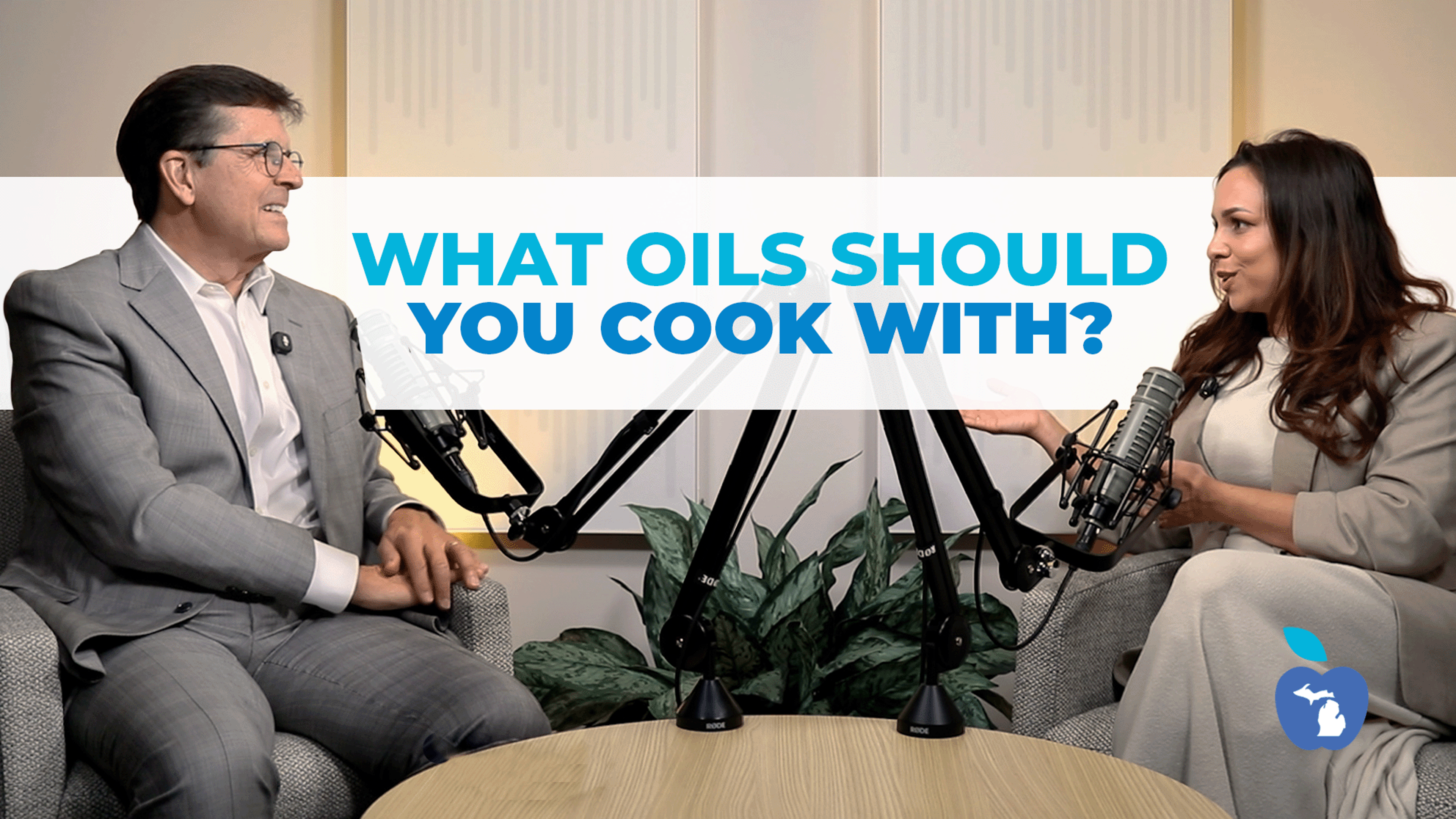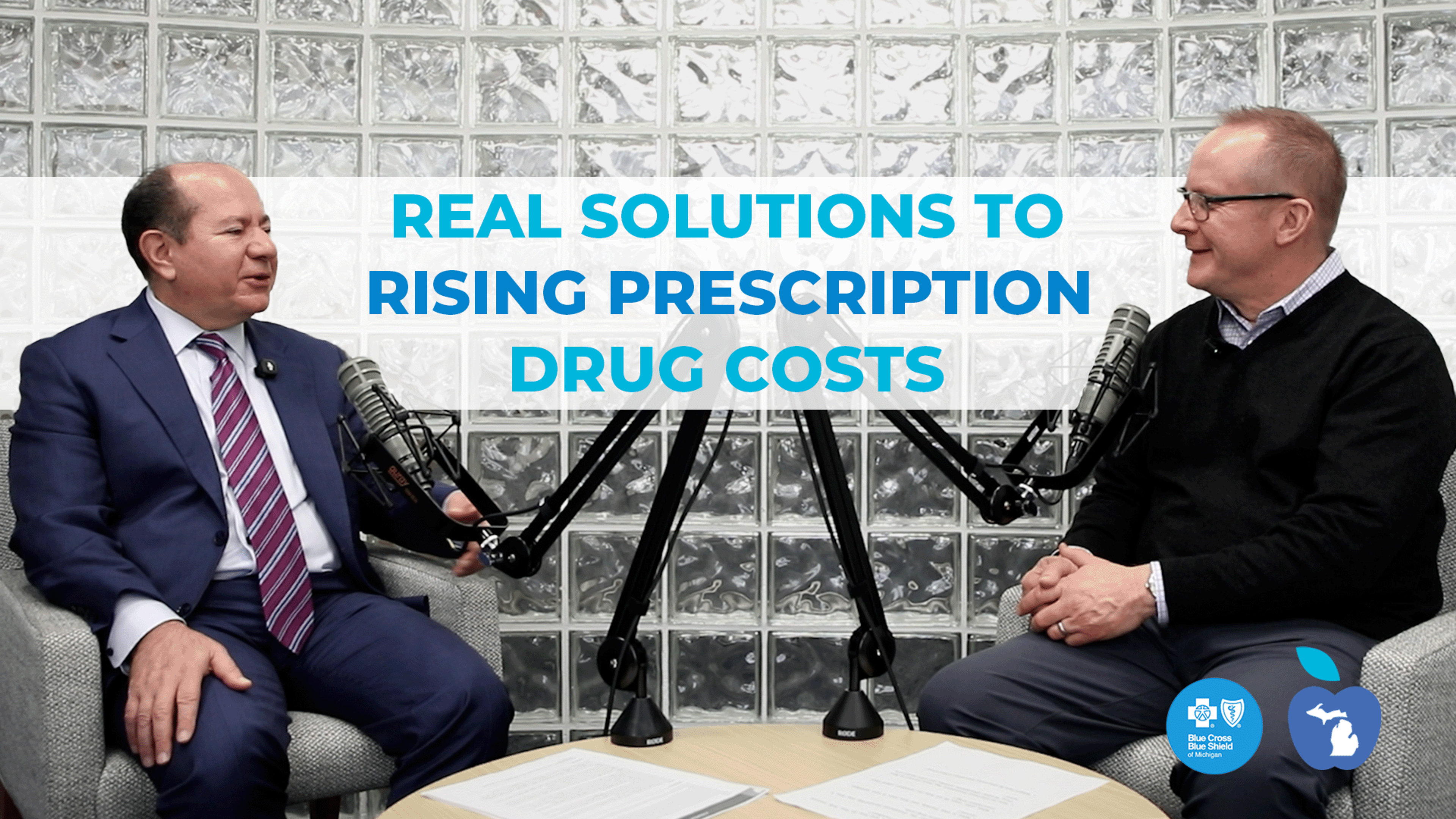The Truth About Metabolism
| 1 min read

00:00
00:00
About the Show
From aging to genetics, we’re exploring the balance between nutrition and metabolism in this four part series.
On this episode, Chuck Gaidica is joined by Registered Dietitian for Blue Cross Blue Shield of Michigan, Shanthi Appelö. Together, they explore the truth about metabolism.
In this episode of A Healthier Michigan Podcast, we explore:
- What exactly is metabolism?
- How much of our metabolism is determined by genetics.
- Common myths about speeding up our metabolism.
- Ways to optimize our metabolic health
Join us in our next episode as we explore the power of nutrition and how our food choices can energize us and support our metabolic health.
Transcript
Here is the full transcript of this episode. You can listen to the audio version on streaming platforms or watch on YouTube.
Chuck Gaidica:
This is a Healthier Michigan podcast. From aging to genetics, we're exploring the balance between nutrition and metabolism. This is part one of a four-part series where we're going to dig into the factors that shape our metabolism. In this episode, part one of this four-part series, I want to take a look at some things with Shanthi Appelö. She is a registered dietitian for Blue Cross Blue Shield of Michigan. So let's go into this fascinating topic because we hear this word a lot: metabolism. It's a term you've heard often. It's blamed for weight changes and energy levels, but how much control do we really have over the complex system in our body that's called metabolism. We can look from genetics to age, to hormones to body composition. Many factors can influence metabolism we're told in a lot of different ways. And then what is it we can and what is it we can't influence? So how do we separate myth from fact and focus on what truly matters when it comes to our metabolic health? So Shanthi is with us. It's good to see you again.
Shanthi Appelö:
Yeah, likewise.
Chuck Gaidica:
Yeah. Let's talk about that, the definition. What is metabolism? And then I guess a good follow up is why does it vary from person to person?
Shanthi Appelö:
Yeah, so I think oftentimes we think of a metabolism as how fast are we using the energy that we eat? But it's more complex than that. Like you said, there are so many things that go into it, a lot of factors to determine what our metabolism is, but it's basically this whole system of our bodily processes. It's things that we can see and things that we can't see. So it's the way that we expend energy, we burn calories, and also we have to think about it as energy that we're constantly supplying our body with. So we can do things like breathe, digest our food, and repair our cells and circulate our blood. There's so many things that goes into it. And I think to define what it is, we need to go back to nutrition 101 because I think it'll help us understand what we could control and what we can't control.
This is a Healthier Michigan podcast. From aging to genetics, we're exploring the balance between nutrition and metabolism. This is part one of a four-part series where we're going to dig into the factors that shape our metabolism. In this episode, part one of this four-part series, I want to take a look at some things with Shanthi Appelö. She is a registered dietitian for Blue Cross Blue Shield of Michigan. So let's go into this fascinating topic because we hear this word a lot: metabolism. It's a term you've heard often. It's blamed for weight changes and energy levels, but how much control do we really have over the complex system in our body that's called metabolism. We can look from genetics to age, to hormones to body composition. Many factors can influence metabolism we're told in a lot of different ways. And then what is it we can and what is it we can't influence? So how do we separate myth from fact and focus on what truly matters when it comes to our metabolic health? So Shanthi is with us. It's good to see you again.
Shanthi Appelö:
Yeah, likewise.
Chuck Gaidica:
Yeah. Let's talk about that, the definition. What is metabolism? And then I guess a good follow up is why does it vary from person to person?
Shanthi Appelö:
Yeah, so I think oftentimes we think of a metabolism as how fast are we using the energy that we eat? But it's more complex than that. Like you said, there are so many things that go into it, a lot of factors to determine what our metabolism is, but it's basically this whole system of our bodily processes. It's things that we can see and things that we can't see. So it's the way that we expend energy, we burn calories, and also we have to think about it as energy that we're constantly supplying our body with. So we can do things like breathe, digest our food, and repair our cells and circulate our blood. There's so many things that goes into it. And I think to define what it is, we need to go back to nutrition 101 because I think it'll help us understand what we could control and what we can't control.
So there's first this idea of basal metabolic rate. You may have seen it when you're calculating your energy needs and all these different calculators, BMR. So it's basically 50% to 80% of our daily energy use. So when we're moving our body around and even when we're sleeping, our body needs energy for breathing, keeping our heart going, all those kinds of things. So that's 50% to 80%. Then we also have the thermic effective food. This is 5 to 10% of our energy use. Basically, our body needs to use energy to digest the foods and the drinks that we consume and to make sure that we're absorbing the nutrients, transporting the nutrients from the cell to where it needs to go and storing our nutrients. So that actually uses quite a bit. And then also the rest is about 20% of our energy, and that's just the physical activity that we do. So it can be things like going to the gym and expending calories that way, or it could just be we're sitting here and I'm moving my hands at the moment.
Chuck Gaidica:
It's interesting to me intellectually, I don't think I understood what I'm about to say, but even as a kid, I would look at my brother. It's my brother, we're in the same family. Genetically we're connected, and as a kid he could eat a pizza, I'm not kidding, he could eat six candy bars and the kid was always skinny. And if I walk past the Dunkin Donuts, I just walk past it, it doesn't go well. And so I know this varies from person to person, but why does that happen? Is it genetics even though it may be as close as my brother and my own family in the exact same household? What's the difference?
Shanthi Appelö:
Yeah, so it's mostly determined by genetics. Some people have slower average fast metabolism. Now, I think when we think of people who are lean, we may think, "Oh, they have a really fast metabolism." And that could be true to some extent. But a lot of it is also that they tend to just be more active throughout the day. Maybe they're a little bit more fidgety, as you may say, and things that... Or the way that an average person moves, they may move a little bit more during those activities. So maybe they're not sitting still as much as someone else. Because when you look at someone who is obese, for example, they do actually use more calories because having a larger body does take more effort to move around, but people tend to be more sedentary. Anyways, there is more to it.
I think too age is a really important one to talk about. Really interesting study that came out in 2021 published in science. They looked at people from 29 different countries, 6,421 subjects, and they looked at people from eight days old to 95 years old, and they found that there's four major phases of where or when our metabolism changes. And so when we're just babies, the energy expenditure is going to be 50% more than an adult. Then around 20 years old, there's a plateau. That's going to be your adult level of metabolism. Then around 60 is actually when this drops, the BMR. And that's really interesting because I think a lot of us tend to think, "Oh, well, I've gained weight in my middle age and that's because my metabolism has slowed." So we're recognizing now with this new research that it doesn't happen until around age 60. And one of the reasons for that weight gain is more likely that we're just being less active. And then one little last step, 90 years old, that's when it really, really drops, 26% below an average adult.
Chuck Gaidica:
There's so much you're saying there that's interesting. And it's all anecdotal. I don't have the studies. When I see somebody who's made it to 90 doing well, often they are thinner, but often they don't eat as much. They're the ones that say, "Oh, I need to wrap up half that sandwich from lunch. I'm full already." So I don't know what's happening there. There's that. And then also between this age of 20 and 60, I'm trying to think of my own life. Well, life gets going. You may get married. All of a sudden, I'm not the 18-year-old who's off to college and running around by myself. Now I've got a wife, a husband, I've got kids, I've got meals. I'm maybe more sedentary, maybe I can't get out to the gym. A lot of life happens in that mid-part.
Shanthi Appelö:
Exactly.
Chuck Gaidica:
Where maybe we're not able to work it all off. But you're saying something that's interesting that leads to a question I bet a lot of people have beyond me, which would be, "Well, if my metabolism is slowing, I'm 25, I'm 45, I'm 65. Well, can't I just speed it up? Can't I move the needle?"
Shanthi Appelö:
Yeah, it would be great if we could do that, right? Especially at that age 60 point where it does really decrease. And so I think that's why it's so important to look back at what we can have control over. When we look at how many calories we're burning, the basal metabolic rate. So with that, it's how much we're burning at rest. Something that does increase that is building muscle. So strength training is going to be a component of that.
So the more muscle we have, the more calories we're burning at rest. So that's something we can do. Obviously the genetic component we can't do anything about. That's most of it. And I will say most of the ways that you can change your metabolism are very minute. They're likely not going to be the difference between you at a healthy weight and an unhealthy weight. And then when we think of thermic effective food, we'll talk a little bit more about this in a future episode, but certain nutrients require more energy to digest than others. So protein requires more energy to digest than carbohydrates. And then finally, that energy that we use during physical activity, this is where we can have some say, how active we are during the day definitely impacts how many calories we're burning.
Chuck Gaidica:
So there's a lot wrapped up in that one as well. You're saying if we focus a little bit more on building muscle and we eat more protein, which obviously helps when you're trying to build muscle, while you're sleeping, your metabolism may be burning at a higher rate if you're looking to lose a few pounds. Am I right?
Shanthi Appelö:
Yeah. And again, I just want to highlight though that the difference is not going to be vast. I think it's better to look at weight loss at our behavior surrounding food, and of course some exercise there too, because that's going to have a greater effect on your weight loss than trying to look at it as tweaking our metabolism.
Chuck Gaidica:
So is that the number one thing? If you were to start to list these in some kind of order, you would start to suggest the behavioral nature of what and how you're eating and all that stuff is number one on the list?
Shanthi Appelö:
Yeah, definitely in terms of weight loss. But when we're looking at metabolism too, we need to understand that it's not this set rate that is always doing the same thing all throughout the day. And I think that's something else we can talk about a little bit, because some of our behaviors can help it go at a more steady rate. Because when we're eating, it's going to work different than, for example, if we're resting or if we're being physically active. If someone is pregnant or nursing, that's going to require more energy to sustain because you're building a life and then you're supplying food to a life which is about 500 calories a day. So there are a lot of different things that change our metabolism even throughout the day. And so that's why eating throughout the day, normal or balanced meals throughout the day, small, five meals or something like that, it can really help us because not only is it going to give us energy to sustain us throughout the day, but it can help that metabolism work at a more steady rate.
Chuck Gaidica:
Now for a lot of us, especially busy people, whether it's family busyness or work busyness or just life in general, finding five meal times, we're used to the three squares idea. Some people are, "No, I'm not a breakfast person. I don't really eat a big lunch." But what you're suggesting is that we focus a little bit more on that idea of trying to get five smaller meals throughout the day, or two healthy snacks and three squares. Would that be an okay way to look at it?
Shanthi Appelö:
I think so. And it doesn't have to be too complicated. When we think about it, it doesn't have to be this super strict meal plan. Maybe you've had your breakfast. You know that you're going to have lunch. You just have an apple in between. It doesn't have to be something that you prepare and put a lot of energy into, but it's that energy that's going to help you sustain throughout the day and also feel better and less sluggish.
Chuck Gaidica:
Well, everything you're talking about, while we're focused on metabolism, it doesn't seem like there's a tremendous downside to picking things up and putting them down in your context, whatever weights you can use or bands or something, it doesn't seem like there's a downside to a little more protein in your diet. Or then adding snacks in between meals that are healthy so you're not snacking later at night to fill yourself up with chips or something. So a lot of what you're talking about makes a lot of sense because it is just good for you anyway.
Shanthi Appelö:
Yeah, it's really good for you anyway, and I think it just makes you feel better throughout the day. And that's a big part of being healthy too, is being able to sustain the activities that you're doing. And I think that's an interesting point that you bring up that it's like these small tweaks that don't really have a downside. It brings me to this idea that people really want easy answers to a lot of things.
Chuck Gaidica:
Fast. I need it fast.
Shanthi Appelö:
Yeah, fast now. And we also like this idea of like, "Oh, well, all this stuff is going on in the background of my metabolism and it's affecting my weight." So that brings me to certain foods that speed up your metabolism, and it's such a myth out there. There's no single food that's going to help. And I don't remember how many years ago this was, maybe 15 years ago, the grass-berry ketones, the green teas, all those were really big. And so there is a little bit of truth to the green tea conversation. There's some research that suggests that, hey, some of these components, including caffeine, could help speed up metabolism a little bit. But research also shows that it's nothing that is going to actually help you lose weight in significant amounts. All of those research studies, we don't see significant results.
Chuck Gaidica:
So I know we're going to continue to focus on this in our series, but give me some idea of takeaways that we can leave with our audience on this, the first of our four episodes.
Shanthi Appelö:
Metabolism is often discussed in the context of weight loss, but let's really look at it as something that we're looking at behaviors that we can do to make you feel good throughout the day, control your caloric intake over tweaking something that the verdict's really still out on from the scientific community.
Chuck Gaidica:
Yeah, good stuff. Well, I can't wait to hear more about it. And now that we know the facts about metabolism to the extent we do, a lot of questions are still left like what can we do to fuel our bodies effectively? Shanthi touched on some of that. But join us for our next episode as we explore the power of nutrition and how our food choices can energize us, support our metabolic health, and then we can get other benefits, which we've heard already. And if you enjoyed this episode, you want to check out more, you can always find us on Apple Podcast, Spotify, YouTube, and every other place where we post new episodes every other week, rather. I'm Chuck Gaidica, your host. Be well.





